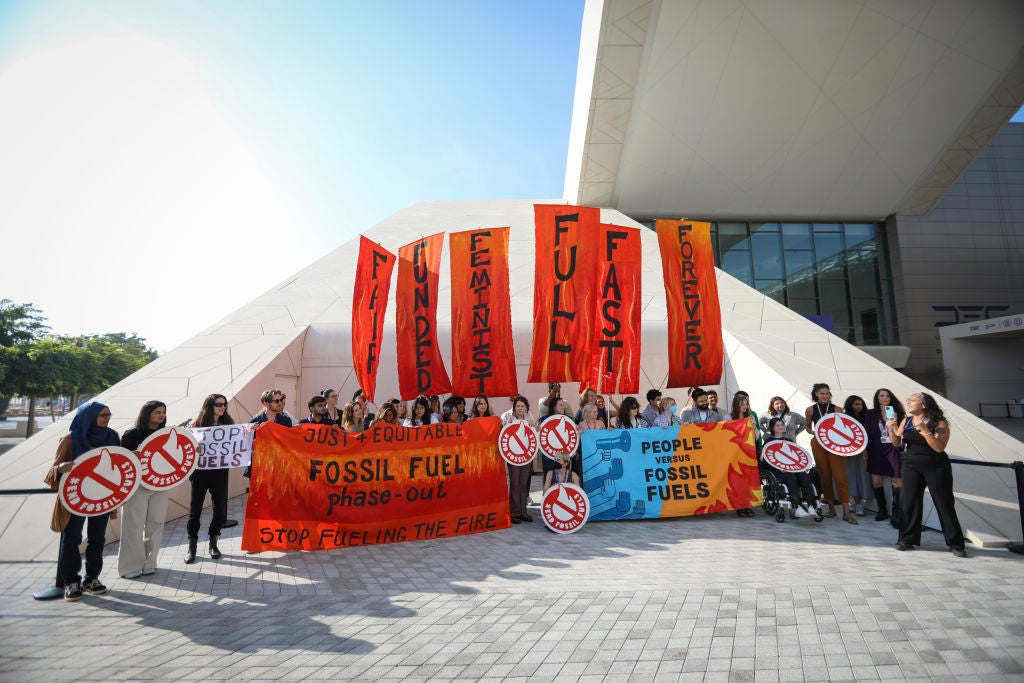At the closing plenary of COP28 in Dubai, most parties gave their expected takes on the final cover text. The representative for the Marshall Islands – a small island state for whom a temperature rise of more than 1.5°C will threaten its very existence – described the final cover text of the Global Stocktake as a “weak and leaky canoe, full of holes” that the world must nonetheless "put into the water because we have no other option".
The representative for Saudi Arabia, long a country that has pushed against language directly addressing fossil fuels, said “we must use every opportunity to reduce emissions, regardless of the source, and we must use all technologies”.
The US, meanwhile, went for the authoritative, statesmanlike take: “While nobody will be completely satisfied with the document, that is how it works out in a consensus,” said John Kerry, avoiding any acknowledgement that his country is the world’s biggest historic emitter, or the world’s biggest producer of oil and gas.
One perspective, however, stood out in its framing of the outcome as a success: “For the first time, science has influenced the outcome of the COP. Not just reports on the shelf, but influenced political decision-making”, said Colombia’s Environment Minister Susana Muhamad. This was not a comment on her country’s position, or an assessment of climate diplomacy, but an assessment of COP28 from the perspective of the only thing that ultimately matters from a climactic point of view: whether or not the outcome aligns with the latest science.
Indeed, this was a COP whose cover text aligned itself directly with climate science. It is littered with references to the “the best available science” and the “latest science”; it also makes frequent reference to the reports of the Intergovernmental Panel on Climate Change, and its key assessment that keeping global warming to 1.5°C requires “deep, rapid and sustained reductions in global greenhouse gas [GHG] emissions of 43 per cent by 2030”.
Similar signposting to this has, however, appeared in previous outcomes. What really upped the status of climate science in COP28's outcome was the much-lauded reference to fossil fuels. Specifically, the text “calls on” parties to begin “transitioning away from fossil fuels in energy systems, in a just, orderly and equitable manner”.
The reason this reference is so crucial is that, for all the talk of abatement technologies or pledges to end emissions of other GHGs like methane, scientific modelling shows us that by far the biggest contributor to climate change is CO₂ emissions produced by burning fossil fuels.
The latest UNEP Emissions Gap report points out that “CO₂ emissions from fossil fuel combustion and industrial processes” account for “two thirds of current GHG emissions”. Separately, the latest Global Carbon Budget, released during COP28 by a team of the world’s leading climate scientists, estimates that nine-tenths of CO₂ emissions released in 2023 are due to humans burning fossil fuels.
Given this scientific reality, several notable voices from climate science have responded very positively to the final COP28 cover text.
“People will see this COP28 as success or a total failure. I am on the positive side here. The final text gives a very clear message that was never present in any of the previous 27 COPs,” said Professor Pierre Friedlingstein, the lead author of the Global Carbon Budget. “COP28 calls for a ‘transition away from fossil fuels’... Now countries around the world have to put these words into actions.”
Dr David Armstrong McKay of the University of Exeter’s Global Systems Institute added: “Including the need to transition away from fossil fuels in energy is a welcome step after nearly three decades of COPs avoiding naming the key problem.”
Richard Betts, from the Met Office Hadley Centre, said: “The Global Stocktake quotes lots of sound science highlighting the urgency of the situation we are in, and this is to be applauded.”
The outcome is nonetheless imperfect. Despite better alignment with the science, little progress is made in the COP28 text on climate adaptation and finance, both of which are key areas that must be addressed if countries are to all develop effective policy responses to what the latest climate science shows us.
Language backed by countries with fossil fuel interests found its way into the text, including “transitional fuels” – which is understood to be code for natural gas – and “carbon capture and utilisation and storage [CCUS]”, a process that environmentalists fear fossil fuel producers intend to use as a cover for continuing to extract hydrocarbons. Current levels of technology-based CCUS amount to a level a million times smaller than current fossil CO₂ emissions, according to the Global Carbon Budget.
The language that the text uses to encourage the transition from fossil fuels – “calls on” – is also understood to be among the weakest verbs present in UN texts in terms of direction; the strongest being “instructs”.
However, in a process that is defined by incremental improvements, the very mention of “fossil fuels” – by far the biggest contributor to climate change – remains hugely significant. This is because it is now all but guaranteed that this language will remain in future COP outcomes, and continue to be improved upon, even if only slowly.
Bill Hare, a leading climate scientist and CEO of Climate Analytics, a climate science and policy institute, described COP28's outcome as “a first nail in the coffin for the fossil fuel industry”, even if oil and gas producers managed to “squeeze in unhelpful language”.
“These small battle wins for the industry are bitter and hollow, and ultimately won’t stop the slide away from fossil fuels,” he added. “Loopholes and false solutions can only serve to delay their inevitable demise, yet it is clear from the text – which is strongly committed to the 1.5°C warming limit – that there is no time to lose.”









